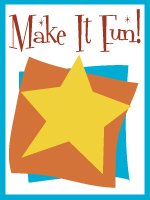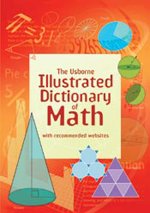
October 08, 2008
Teaching math is as easy as 1, 2, 3...
In This Issue:
- Conquer Math Anxiety
- Dollars and Sense - Teaching Kids about Money
- Homeschool Math Essentials - An Expert Weighs In
- October Giveaway!
Conquer Math Anxiety
It often seems that math is a black and white subject with little gray area - you either love it or you hate it, you either get it or you don't. Here are 3 ways to conquer math anxiety and make math instruction fun:Move at Your Child's Pace
Moving too quickly is a sure way to cause frustration in your home school. Let your child set the pace for math instruction instead of following an arbitrary scope and sequence. Don't be afraid to slow down and review or reteach concepts that haven't been mastered.
Let your child know that making mistakes is a part of learning. Relieve any pressure he may feel by not placing an emphasis on grades. Let your child sit with you as you correct assignments. Discuss wrong answers and let him make corrections.
Don't be afraid to change curriculum if your math program is not a good fit for your family. Here are some tips for choosing a homeschool math curriculum.
Teach in a Way that's Right for Your Child
Relax! You don't have to stand over your child with a timer as he races through math drills. As a homeschooler, you can teach in a method that suits your child.
Some children love timed worksheets, but freeze up when you pull out the flashcards. Some children enjoy playing games and reviewing facts orally. Others thrive when using computer programs or self-checking materials that prevent others from seeing their mistakes. Even something as simple as working on a dry erase board instead of paper can make a difference for some students.
Become familiar with your child's learning style, and find out what motivates your child and what causes anxiety. Experiment until you find techniques that work well for your family. Here are some homeschool math activities you may enjoy.
Change Your Attitude
Parents who had a difficult experience with math can sometimes pass that attitude on to their children, creating a frustrating experience for both teacher and student. Lose the mindset that math is "boring," "difficult," or "too hard."
If math instruction in your homeschool has taken on a negative tone for any reason, take a break and begin again with a fresh outlook and a new attitude. Math is a useful, enjoyable subject that we are all capable of learning (yes, that includes homeschool moms). If your understanding of math is less than desirable, sit down and learn right alongside your child!
Dollars and Sense -
Teaching Kids about Money
 |
Preschool
It is never to early to begin teaching your children to save money! Let your preschooler sort coins by shape and color, and count coins as he places them in a piggy bank. This not only gives your child an early lesson in savings, it is a great math and fine motor activity.
Elementary
These are the years to begin talking to your child about banks, savings and interest. Take your student to the bank to open a savings account. Let your child regularly deposit a portion of any money she receives and watch that money grow.
Work with your child to set goals for small purchases, and allow him to make withdrawals on birthdays and other special occasions. Help your child learn to delay gratification and distinguish between a need and a want.
Middle School and High School
Give your child increasing responsibility during the middle school and high school years in preparation for the time when he or she will leave home.
Let your child open a checking account and begin teaching him to track income and expenditures. Give your child an area of financial responsibility - such as clothing or social activities. Teach him how to plan for both small and large expenditures.
Begin sharing your family's philosophy on saving, giving, debt and other money matters, and build a foundation for sound decision-making.
Here is some information about choosing a bank account for your child.
In October, I launched a blog series called Make it Fun Monday! Every Monday, from now until December, I'll share a fun ideas like this one that can be adapted for all ages. For details, check out my homeschool blog.
Homeschool Math Essentials -
An Expert Weighs In
Last month, I had a chat with Maria Miller - homeschool mom, former math professor, and creator of Math Mammoth e-books and workbooks. Here are some of Maria's thoughts about successful homeschool math instruction. - Why do so many families encounter frustration when working with numbers? The basic reasons have to do with how the parents understood math as students, how it was taught to them, and what attitudes towards math their teachers and peers conveyed to them. In the USA, it is acceptable to be math-illiterate, and confess (as an adult) that one doesn't know math at all. It's commonplace for people to comment how little they know about math, or how they hate it, etc.
But if math is taught as a logical system so that all kids are allowed to understand the basic math, and if the general culture values mathematics and related skills, this won't happen.
- What can parents do to give their children a strong foundation in math? They need to show a positive attitude towards math and numbers themselves. Attitudes are contagious! This is so very important. Then, they can choose good materials that fit the child's learning style. Parents should be sensitive to "math woes" in the family and reach out, if need be, because often one can correct those by using a different curriculum or materials.
- What should parents look for in a math curriculum? They should check if the curriculum teaches conceptual understanding, or if it favors "recipe math", in other words spelling out the rules of "how" to do it, but being skimpy on the explanations of "why".
That is the most important thing. Then, there will be several other considerations:
- does the child get distracted by colors and pictures or will it make it more pleasant and interesting to the child?
- does the child need lots of white space, big writing space, or can the child write in smaller space?
- how much teacher involvement does the curriculum require, and how much time can you devote to daily teaching?
- are there additional costs such as manipulatives, and can you afford those? etc.
- Why did you create Math Mammoth? Actually I didn't just start with it. I started just by writing ebooks on one topic such as addition or subtraction or geometry or fractions and sold them on my www.homeschoolmath.net site. The need for a "brand" or a name came later.
I started writing the original books because I had been tutoring some homeschooled kids, and I saw tremendous lacks in the materials they were using. I also realized those moms did not have the understanding to explain math to their kids in such a way as to promote conceptual understanding.
October Giveaway!
 |
We were overwhelmed by the many high quality reviews we received in last month's homeschool curriculum review contest. Last week, I mailed over $400 worth of Usborne books to qualified participants who helped me collect 430 homeschool curriculum reviews.
Many thanks to those of you who made this project a success! Please visit the website often to find information about products you are considering and share opinions about products you have used in your home school.
This month, I am giving away Usborne's Illustrated Dictionary of Math - an internet linked resource that contains over 500 definitions, 300 illustrations and diagrams, and 100 worked examples. You can find details of this month's contest here.
As always, feel free to pass this newsletter on to friends and contact me with your questions or comments.
Thank you for subscribing to Successful Homeschooling.
Enjoy the journey,
Carletta